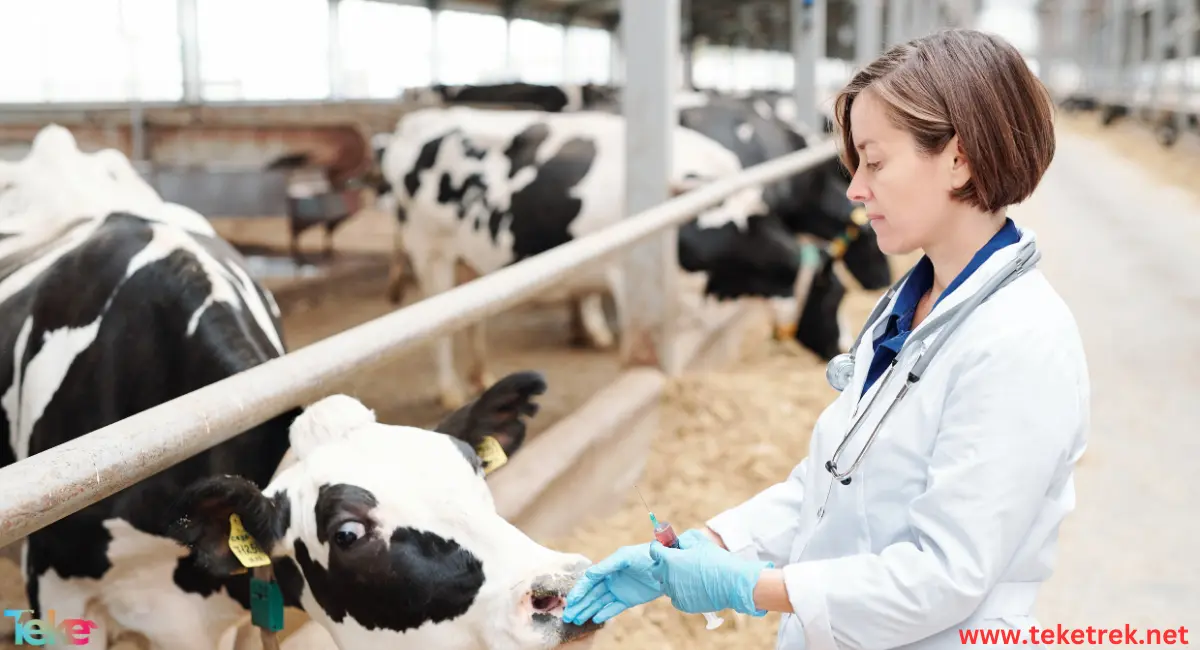Animal health care is one of the most important issues that occupies a large part of the minds of wildlife lovers, in addition to the attention given by the World Organization for Animal Health according to specific standards.
Animal care requires a great commitment from communities and individuals alike, as it includes providing adequate food and providing sufficient space to play, in addition to learning the ideal way to deal with them and understanding their behaviors.
If you are a pet lover and want to raise them, follow this guide from teketrek with us to learn about the meaning of animal health care and how to take care of it, in addition to the most important questions that revolve around it. Stay with us.

Meaning of animal health care
The term animal health care refers to the mental and physical care of animals by performing some services and activities that aim to vaccinate the animal from diseases, diagnose and treat them, by providing sound food and permanent veterinary care, in addition to giving them the necessary vaccinations, which ensures a healthy life for these creatures. .
It should be noted that animal care is closely linked to the environment in which it lives, as it must be within safe and healthy environments that contribute to reducing the spread of diseases. This responsibility is the combined efforts of governments, individuals and institutions alike, as it is a process that has political, economic, religious, ethical and scientific dimensions. Social and cultural.
It is worth noting that a strategy for this field was developed by WOAH (World Organization for Animal Welfare), to serve as a guidance for the organization’s work through the standards it set for this matter, as it was adopted by all member states in 2017 with the aim of achieving a world that promotes health and welfare. The animal respects it and advances it.
How to care for pets
Pets are those creatures that humans can coexist with under one roof, including ferocious animals such as lions and tigers, which will get used to their owner only with the passage of time by following a certain policy, which means that the relationship between these animals and humans is a symbiotic relationship, meaning that they It will benefit both of them, and below we will put in your hands a list of the most important issues related to animal health care that must be taken into consideration, which are:
Effort and time: Caring for an animal is a responsibility no different from other responsibilities, as it requires attention to various details and providing continuous care for what it needs.
Financial cost: This matter is not limited to the price of the animal, but also includes some of the basic needs, such as special food, medicine, toys, and many other things.
Sleeping place: which must be well ventilated with sufficient space allocated for playing and moving.
Age of the animal: When planning to acquire a pet, you must know the appropriate age to raise it. For example, it is not recommended to buy dogs that are less than 45 days old and not more than 6 months old. As for cats, it is better that they are not less than a month old.
Health care: which includes giving him vaccinations on time, in addition to monthly pills that protect him from worms living inside his body.
Based on this, we will provide you with the most important details related to raising some animals, which are as follows:
Health care for dogs
Dogs are pets that over time turn into loyal friends for the family. If you want to go to a dog breeder recruitment office in your area, or want to raise him in your home, you should look at the points related to his health care:
Providing proper food, as dogs need a diet that includes the various necessary elements that they need, and this is done through (choosing high-quality food, providing regular meals by dividing them into two or three meals, and avoiding harmful foods such as onions, garlic, and chocolate).
Determine the amount of food as it varies according to age, size and physical activity, and it is important to seek advice from a dog health and care specialist.
Performing exercises and physical activities for dogs, such as walking and playing with balls, helps maintain their ideal weight and enhance their health, in addition to stimulating their mind, which contributes to reducing destructive behaviors resulting from boredom.
Regular health care through periodic examinations and necessary vaccinations, in addition to taking care of the gums and teeth.
Taking care of dogs’ mental health through social interaction and providing a stimulating environment, in addition to a regular daily routine.
Cat health care
Cats are cute furry animals that many people want to raise and care for to add a lot of joy to their lives. Below we will mention to you the most important details regarding how to provide health care for them as a major matter in caring for animal health:
Allocate a suitable litter box and clean it periodically, but attention must be paid to the necessity of placing clean, high-clumping sand in it to eliminate unpleasant odors and avoid changing it frequently.
Bring her own foods, such as (meat, boiled chicken, taking into account that no spices are added to it, fish, tuna without oil, dry food, and canned food intended for cats) and avoid the following foods: (processed or undercooked meat, spices, onions, garlic, vinegar, Meat from bones, milk, sweets and fruits).
Visit the doctor regularly and give her the necessary vaccinations.
Give her her vitamins.
Spend fun times with her, playing and having fun.
Maintain her bathing schedule with lukewarm water and use a special cat shampoo. It is necessary to dry her hair and brush it with the brush designated for her.
Providing a safe environment for her and protecting her from any danger.
Cow health care
Many people want to raise cows as they are a source of food and a source of good income by selling their milk. Therefore, in the context of caring for animal health, we will explain to you how to take care of cows:
Providing her with high-quality food and a group of vitamins and minerals.
Milk the cow 4 times a day.
Walk outdoors continuously.
Ventilate the room regularly.
Avoid overfeeding her during the cow’s dry period because this will lead to decreased fertility and the occurrence of health diseases such as hypoglycemia.
Communicate with your veterinarian on an ongoing basis.
Provide enough space to allow her to move comfortably.
Put it in dark places and take care to clean them.
Monitor weight and production continuously.
Cleaning tools used in care.
Bird health care
If you want to raise birds and enjoy the sweet melodies that will dazzle you, you must take care of their health according to a specific system that we will explain to you in the following lines:
Providing a diet consisting of 80% high-quality bird pellets, in addition to 15% to 20% fruits and vegetables, with a limited percentage of nuts and seeds.
Place the cage in the corner or on the wall opposite where you sit with your family, making it feel like a part of the family and giving it more protection and security.
Place food and water in a high place to protect it from contamination.
The cage must be in a place away from drafts.
The necessity of daily exposure to the sun (UVB and UVA rays), which is important for making vitamin D and protecting bones.
Providing him with safe and clean toys and figures that will help him spend happy times.
Maintain its cleanliness by giving it regular baths to maintain the health of its skin and feathers.
Names of veterinary medicines and their uses:
At the beginning, we must point out that veterinary medicine is any substance that is given to food-producing animals, such as: poultry, bees, fish, and used for preventive, therapeutic, or diagnostic purposes, or with the aim of modifying behavior and physiological functions. In the context of our talk about animal health care, we will mention some of these. pharmaceutical:
Anthelmintic medications: (Askazine, Benzatil, Tetramazole 10, 30 and 600, Parazol, Tylosan, Durmer of several types, Helmentin, Levozan) and many others.
Antibacterials and vitamins such as: (Oxyvitamin, Super Vitasol, Neocycline, Colocycline, Flumoquine 20%, Oxyvitamin C, Colistin 80).
Anti-inflammatories (C-methol).
Vitamins and mineral salts such as: (Fabco salts, Super Vitamin, Equivit Shea, Fabcovit, Vitamin E, Vitafort, Camelovit Race, Menavit Fortified, and many others.
Veterinary insecticides such as: (Destrin, Deltafab 2.5 and 5%, Diazinon 20, 15% and 60%, Fabcopur, Combat Shampoo, Flumipur, Fabcocidin 10% and 20%, and many other pesticides.
Sulfa compounds such as (triple sulfa, triple sulfa developer, tertiary sulfa developer, sulfamycin-K, sulfaguanidine, and others.
Ointments such as (sulfur ointment, zincamide and adarine ointment).
Miscellaneous such as: (electrolytes, bromhexane, protein 100, propion, hydroprotein and many others.
Injection pain relievers (Noralgin, Diclovab).
Vitamin injections such as: (Thiumin, Vitamin D3E, Vitamin K3 – 10%, Tocovit-C).
Injections of sulfa compounds (Fabcodemidine – 33%).
Injection diuretics (Renamide – 5%, Dexamide).
Antispasmodic injections (Atrovap).
Anti-inflammatory injections: (Histalite, Flunexivab, Fabco Cortin-Fortified, Flunexivab).
Antiparasitic injections such as: (De-Carb, Pyroplasmin, Thilacid).
Deworming injections such as: (Tetrazone, Rafumectin, Rosantil 10% and 5%, Vermectin, and others.
Fish preparations (Marinavit).
Local anesthetic injections (Lidofrene and Lidofab – 2%).
Disinfectants.
Bee preparations.
Coccidiosis antibiotics.
Antibiotics.
Treatment of bloating and intestinal confusion.

FAQs about animal health care
- What does animal health mean?
It is the general condition of the animal in terms of growth, well-being and productivity, in addition to the ability to resist diseases and includes several aspects.
- How do we maintain the health of the pet?
Protecting natural environments, enacting laws and legislation that protect them, establishing reserves, considering some of them as national symbols, and raising awareness on a large scale.
- How should you care for the dog?
Proper nutrition, exercise, and medical care are provided. They also need socialization and training to modify their behavior.
- Who takes care of sick animals?
There are many people who specialize in animal care, including: veterinarians and their assistants, animal groomers, non-profit organizations, animal care centers and pet owners.
In conclusion, we find that caring for animal health is not only a duty towards these creatures, but also a human responsibility that embodies the values of compassion. This enhances the health of the ecosystem, so it is worth a lot of effort. Be a participant in achieving the ultimate goal of providing these creatures with the opportunity to live healthy and strong.





